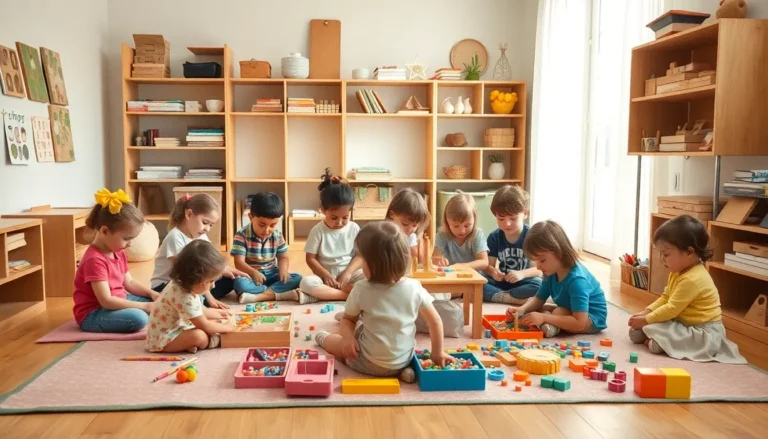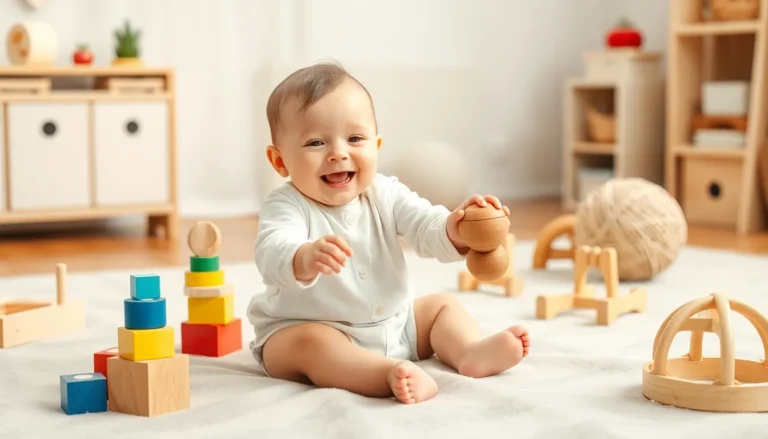Table of Contents
ToggleFamily traditions are like the secret sauce that gives life its flavor. They’re the quirky rituals and heartfelt customs that bind generations together, often leading to laughter, eye-rolls, and maybe even a little chaos. Whether it’s a unique holiday celebration or a weekly game night that turns into a fierce competition, these traditions create lasting memories and shape family identities.
In a world that’s constantly changing, holding onto these cultural gems is more important than ever. They remind us of where we came from and offer a sense of belonging. Plus, who doesn’t love a good story about that one time Uncle Bob tried to cook the family recipe and almost burned down the kitchen? Dive into the fascinating world of cultural family traditions and discover how they enrich lives, strengthen bonds, and keep families laughing for generations.
Understanding Cultural Family Traditions
Cultural family traditions serve as important conduits for connecting family members across generations. These traditions incorporate values, beliefs, and customs inherent to specific cultures. Rituals can vary greatly, from daily practices to annual celebrations, each providing unique insights into family heritage.
Celebrations, such as holiday gatherings, often include specific foods and activities that reflect cultural significance. These events bind families together, creating shared experiences that foster unity and understanding. Special days around Thanksgiving or Diwali highlight traditions that evoke memories, reinforcing a sense of identity.
Rituals like storytelling link present family members with ancestors. These narratives transmit wisdom and values, offering lessons for future generations. Storytelling nurtures relationships, teaching younger generations about their family’s history.
Participation in traditional arts and crafts enhances cultural awareness as well. Families engage in practices that highlight their cultural uniqueness, such as making traditional clothing or art. This engagement cultivates pride in one’s background while ensuring the preservation of crafts passed down through generations.
Intergenerational activities, including game nights or music sessions, invite fun while honoring tradition. Such gatherings can offer moments of joy and laughter, creating an atmosphere of warmth. Engaging in these activities increases familial bonds, resulting in cherished memories.
Understanding and preserving cultural family traditions enriches relationships. They contribute to a deep sense of belonging within families, reminding members of their roots while creating a supportive environment. As cultural landscapes evolve, prioritizing these traditions ensures their vitality for future generations.
Importance of Cultural Family Traditions


Cultural family traditions play a crucial role in fostering connections and preserving identities. These customs strengthen family bonds and enrich the experience of belonging.
Strengthening Family Bonds
Shared rituals create a sense of unity within families. They encourage collaboration and teamwork during activities such as cooking or crafting. Participating in these traditions instills values of cooperation and communication. Moments spent together during family celebrations build lasting memories. Holidays like Christmas or Eid often serve as focal points for gathering, enhancing relationships among all generations. Regular engagement in these activities promotes trust and understanding. Furthermore, storytelling during family meetings creates space for reflection on shared experiences, reinforcing familial connections.
Preserving Cultural Heritage
Cultural family traditions safeguard unique practices and beliefs. They transmit distinct values from one generation to the next. By celebrating festivals like Lunar New Year or Hanukkah, families honor their cultural backgrounds. This act of remembrance not only solidifies identity but also cultivates pride among members. Engagement in traditional arts nurtures appreciation for heritage, encouraging younger members to partake in these customs. Maintaining these practices ensures that diverse cultures continue to thrive and evolve. Additionally, participation in family traditions cultivates a richer understanding of one’s roots, emphasizing the importance of cultural continuity.
Examples of Cultural Family Traditions
Cultural family traditions manifest in various forms, enriching family bonds and preserving identities through shared practices.
Celebrations and Festivals
Many families celebrate significant events that hold cultural importance. Various holidays like Thanksgiving, Christmas, Diwali, or Hanukkah bring family members together, fostering unity and connection. Celebrations often include special meals, music, and decorations that reflect cultural heritage. For instance, families might gather to share a festive feast, emphasizing gratitude or joy. Such occasions invite each generation to participate in customs that honor their ancestors. Engaging in traditional activities, like kitchen preparations or storytelling, creates lasting memories, reinforcing family ties.
Rituals and Ceremonies
Rituals and ceremonies serve as vital expressions of cultural identity within families. Birthdays, weddings, and coming-of-age ceremonies signify important life milestones. Families might hold unique customs, such as the Quinceañera or Bar/Bat Mitzvah, celebrating major transitions with traditions that have deep-rooted significance. These events often encompass specific rituals, such as prayers or dances, ensuring the transmission of cultural values. Participation in these ceremonies allows families to bond, creating a collective experience that resonates across generations. Each ritual provides an opportunity to reinforce the family’s cultural narrative and strengthen connections among all members.
How to Incorporate Cultural Family Traditions
Incorporating cultural family traditions enriches family life and strengthens connections among members. Families can actively engage in practices that reflect their unique heritages.
Tips for Families
Discuss traditions during family gatherings. Share stories that illuminate the significance of specific customs. Participation in cooking traditional meals invites everyone to contribute. Planning annual celebrations around cultural holidays fosters excitement and anticipation. Encourage family members to suggest new ways to celebrate existing traditions, enhancing participation and creativity.
Engaging the Younger Generation
To capture the interest of younger family members, involve them in the planning process. Create interactive experiences around traditional events, such as themed crafts or cooking activities. Use technology to share traditions, like video calls with relatives who live afar. Make storytelling sessions engaging by inviting children to share their experiences. Adapt rituals to include modern elements, ensuring they resonate with younger participants.
Cultural family traditions are more than just rituals; they’re the heartbeats of family life. By embracing these customs, families can foster a sense of belonging and unity that transcends generations. Each celebration and shared experience strengthens bonds and preserves unique identities, creating a rich tapestry of memories.
As families navigate the complexities of modern life, maintaining these traditions becomes even more vital. They serve as anchors, connecting past and present while instilling values in younger generations. By actively participating in cultural practices, families ensure that their heritage continues to thrive, enriching their lives and the lives of those who come after them.







